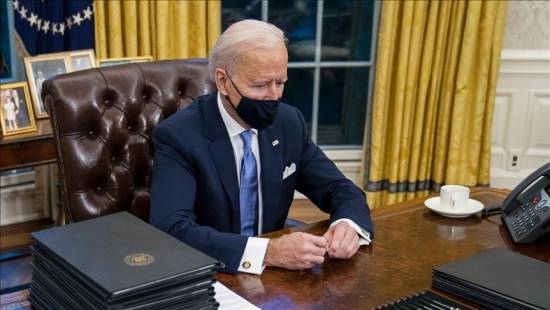US President Joe Biden will sign executive orders Wednesday to pause new oil and natural gas leasing on public and offshore lands as part of his climate change and clean energy policies.
The orders will direct federal agencies to eliminate fossil fuel subsidies and identify new opportunities to spur innovation, commercialization and deployment of clean energy technologies and infrastructure.
"President Biden set ambitious goals that will ensure America and the world can meet the urgent demands of the climate crisis ... to lead a clean energy revolution that achieves a carbon pollution-free power sector by 2035 and puts the US on an irreversible path to a net-zero economy by 2050," the White House said in a statement.
"The order clearly establishes climate considerations as an essential element of US foreign policy and national security," it added.
Biden signed an order last Wednesday to rejoin the Paris Climate Change Agreement, which his predecessor, Donald Trump, initiated the US' exit from the historic deal in 2017.
Biden's moves are largely part of undoing Trump's energy policies that focused on "unleashing" shale oil and gas potential in the US, which has become the world's largest crude oil and natural gas producing country during his tenure.
"I am not banning fracking. No matter how many times Donald Trump lies about me," Biden said in August about technology that helps extracting shale oil and gas known as hydraulic fracturing, although Trump argued otherwise.
While Biden's new orders will not affect existing oil and gas leases, it applies only to lands that account for less than one-quarter of total US oil and gas production.
Whole-of-Government approach
The president's orders will also establish a National Climate Task Force that will include leaders from 21 federal agencies and departments to enable a "whole-of-government approach to combatting the climate crisis."
He will host a Leaders' Climate Summit on Earth Day, April 22, when the US will reconvene the Major Economies Forum to discuss foreign policies in climate change.
The White House Office of Domestic Climate Policy will be formally established, led by the nation’s first National Climate Advisor and Deputy National Climate Advisor.
Biden created a new position, the Special Presidential Envoy for Climate, which will have a seat on the National Security Council. "It will be a US priority to press for enhanced climate ambition and integration of climate considerations across a wide range of international fora," according to the White House.
The orders also start the process of developing the US’ "nationally determined contribution" known as its carbon emission reduction target under the Paris Agreement, in addition to a climate finance plan.
While the US Director of National Intelligence is directed to prepare an estimate on the security implications of climate change, the State Department and other agencies are ordered to develop strategies for integrating climate considerations into their work.
Infrastructure and technology
Biden's other executive orders will include job creation in construction, manufacturing and engineering as part of his economic recovery plan where his clean energy jobs plan will be centered.
He will direct federal agencies to procure carbon pollution-free electricity and clean, zero-emission vehicles to create union jobs and stimulate clean energy industries.
The president will focus on conserving at least 30% of US lands and oceans by 2030, restoring public lands and waters, increasing reforestation and protecting biodiversity by adopting "climate-smart agricultural practices."
Biden will direct agencies to make evidence-based decisions guided by the best available science and data "with the responsibility for ensuring scientific integrity across federal agencies."
The order will reestablish the President’s Council of Advisors on Science and Technology, co-chaired by the President’s Science Advisor who will advise him on policies that affect science, technology and innovation./aa


